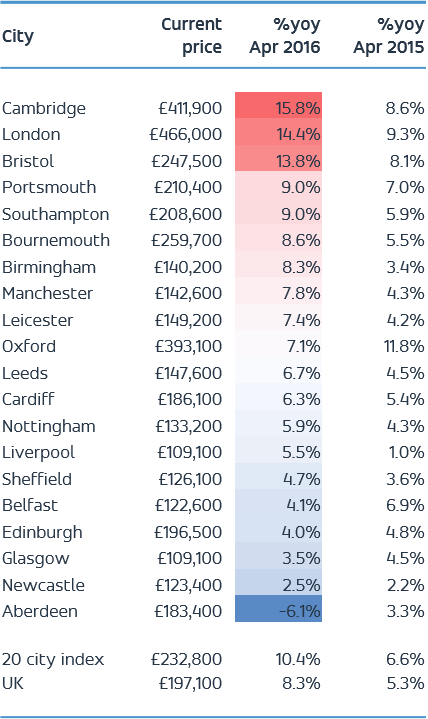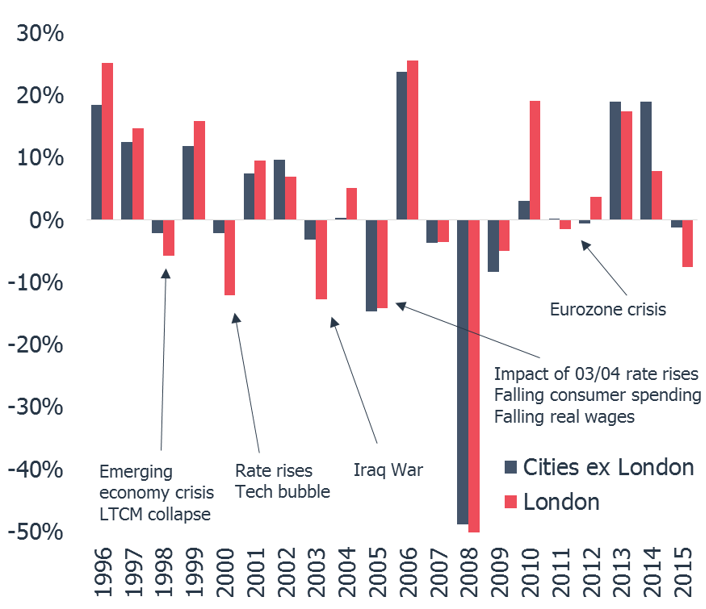Confirming payment details

Payment processing

Login or Sign up
Forgot password
Enter your email address and we will send you a password reset link or need more help?
Latest Hometrack UK Cities House Price Index reveals house price growth running at 10.4% up from 6.6% twelve months ago
On 27 May, 2016- Year on year city level growth ranges from 15.8% in Cambridge to -6.1% in Aberdeen
- A referendum vote to leave the EU likely to impact transaction volumes more than house prices
- Hometrack estimates UK Cities could see a 5%-10% reduction in transactions on a vote to leave
- A ‘Brexit’ would hit London market activity hardest
- A vote to remain would most benefit regional cities such as Manchester, Leeds and Birmingham
The latest Hometrack UK Cities House Price Index reveals that city level house price growth is running at 10.4% compared to 6.6% twelve months ago when growth slowed in the face of uncertainty over the 2015 General Election.
The recent surge in transactions ahead of the April 2016 stamp duty change resulted in most cities registering a spike in monthly house price growth with the annual rate of growth higher than 2015 in 15 of the UK’s 20 leading cities. Cambridge continues to lead the way recording a 15.8% increase while Aberdeen is the only UK city bucking the upward trend posting a fall of -6.1%.
The impact of the forthcoming EU referendum on the economy and the housing market is an area of heated debate. The latest UK cities house price index report reflects on 20 years of house price growth and housing turnover to reveal how external factors can impact housing market activity. What this analysis shows is that uncertainty amongst consumers over the outlook for the economy and personal finances tend to have a greater impact on the volume of housing transactions rather than house prices.
This historic analysis implies that were the UK to vote for ‘Brexit’ then there could be a 5% to 10% reduction in housing transactions that would particularly impact London. A vote to remain would deliver a boost to market confidence and deliver the greatest benefit to large regional cities such as Manchester, Leeds and Birmingham where housing demand is growing and current rates of house price growth are likely to be sustained.
The analysis highlights how transactions have varied over time and some of the external influences. While many associate the decade before 2007 as a period of strong house price growth, the reality is that sales volumes fell on four occasions in London by as much as 15% highlighting how London is more prone to the impact of external factors, especially after periods of rapid price appreciation - from the crisis in emerging economies and collapse of the Long Term Capital Management hedge fund in 1998 to the bursting of the dot-com bubble in 2000 and the Iraq war in 2003. The 15% drop in sales seen in 2005 was registered across the country, driven largely by domestic factors and rising interest rates in 2003/04. In contrast, the impact of the 2011/12 Eurozone crisis on turnover was more muted as the market was just starting to recover after the 2008 financial crisis.


Richard Donnell, Insight Director at Hometrack says:
“The economic impacts of a vote to leave will dictate the impact in the housing market. Our analysis of how the market has responded to external factors over the last 20 year suggests that a vote to leave on 23 June could result in a 5% to 10% fall in housing turnover with London bearing the brunt. After a period of strong house price inflation over the last 5 years, the London market faces greater headwinds irrespective of the referendum vote. Turnover fell 7% last year on the back of affordability constraints and weaker overseas demand. Tax changes for investors will reduce demand and we expect price growth to slow in the near future even if sterling were to weaken and improve the relative value of central London property.”
Donnell continues:
“A vote to remain will have the greatest upside for house prices and transactions in regional cities where the recovery has been more short-lived and affordability less stretched than in southern cities. The boost to confidence from a vote to remain, coupled with low mortgage rates would most likely benefit cities such as Manchester, Leeds and Birmingham as housing demand and price growth seems set to sustain itself.”
The Hometrack UK Cities House Price Index is Not Seasonally Adjusted
NOTE – The definition of London ‘City’ is larger than the London Government Region. The ‘City definition extends further out into London’s travel to work area capturing the commuter areas outside the 33 London Boroughs. The London ‘City’ area covers 44 local authorities and better represents the housing markets that are influenced by the London economy.
-ENDS-
About the Hometrack UK Cities House Price Index
The new Hometrack UK Cities House Price index has been designed to provide a granular analysis of housing market trends at a city level – cities are the focus for economic and demographic change as well as a focus for greater cross-area collaboration. The 20 cities in this new house price index cover a land area that is less than 5% of the UK but the cities contain over 40% of the value of UK housing and a similar proportion of all UK jobs. (See notes for more information on the index series.)
NOTES FOR EDITORS
1. Hometrack’s house price indices (HPI) are designed to track, as closely as possible, the performance of UK residential capital values over time. We have a track record of developing and running proprietary, localised, sub-regional house price indices for over a decade. Localised house price indices form a key part of the Hometrack automated valuation model where indexation is a key element of the valuation system. This valuation system is trusted by 4 of the top 5 lenders in the UK.
2. From October 2014, we are publishing a unique index based on 20 UK cities. We will also be producing indexes for the UK, Government Regions and the countries of Scotland, Wales and Northern Ireland. Interactive analysis, further information and FAQs on the index can be found at www.hometrack.com.
3. This new Hometrack UK Cities House Price Index is very different to our historic monthly housing survey which was an aggregation of the views of a large sample of agents and surveyors on key market trends in their local area. The survey has been dis-continued. Selected market metrics from the survey are being calculated from listings data and are available in Hometrack products and services.
4. The geographic definition of a city is based upon Primary Urban Areas – these cover the built up area of a city or a city region. Primary Urban Areas for English cities were defined in a report published by Government entitled The State of the English Cities Volume 1, ODPM, 2006. All cities are based upon amalgamations of single or multiple local authorities. The Primary Urban Area methodology has been applied to major cities across the rest of the UK covering Scotland, Wales and Northern Ireland.
5. Hometrack’s UK Cities House Price Index is created using a repeat sales based methodology drawing upon a large database comprising 100% of recorded sales prices from the Land Registry ‘Price Paid’ dataset and equivalent data from the Registers of Scotland. This price paid data is supplemented by mortgage valuation data.
6. The Hometrack UK Cities House Price Index is weighted according to the volume of private housing stock in each geographic area. The property type weightings are adjusted dynamically over time each quarter as the stock of housing grows, but the absolute changes are small.
7. The primary output of the UK Cities House Price Index build process is a monthly ‘multiplier’, the amount by which house prices have changed over the period based on the available evidence for the relevant geography. This monthly multiplier is used to create an index of house prices.
8. The Hometrack UK Cities House Price Index is revisionary i.e. there are revisions each month as more data comes available as sales are registered and further information becomes available. All UK house price indices are published on a revisionary basis. The scale of monthly revisions tends to be larger for smaller geographies where sales volumes are lower and indices can be more volatile at the leading edge. The historic revisions are minimal for the largest geographies.
9. The series are supplied on a non-seasonally adjusted basis.
10. In order to calculate the average price, the monthly price changes are applied to an average price to create a time series for average house prices from a base date which was in December 2013.
11. All average prices and percentage changes are expressed in nominal terms i.e. not adjusted for inflation.
12. Further information can be found at ww.hometrack.com
The latest Hometrack UK Cities Index reveals that in the three months to September house price inflation in London recorded the lowest quarterly growth for 20 months.
The latest Hometrack UK Cities Index reveals house price growth has fallen to 8.2% as the slowdown seen in cities across the south of England in recent months intensified in August.
London, Tuesday 13th September: Hometrack has been appointed by digital challenger bank, Atom, to provide a range of Automated Valuation Model (AVM) services.
The latest Hometrack UK Cities House Price Index reveals a marked slowdown in house price growth over the last three months, led by a deceleration in London and other high value cities across the south of England.

Subscribe to receive email updates.
HometrackGlobal:
Linked In: